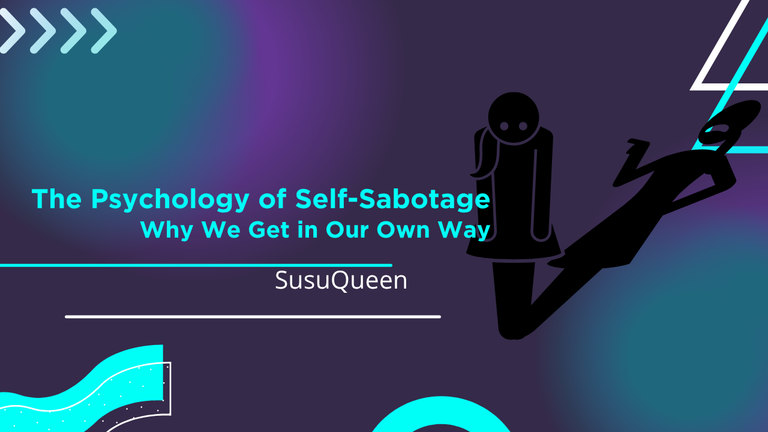The Psychology of Self-Sabotage: Why We Get in Our Own Way
You know that feeling when you really, truly want something like starting that business, getting in shape, or finally writing that book but then you just... don't? Instead, you find yourself scrolling Instagram for three hours or reorganizing your closet for the fifth time this month.
It's maddening. You're literally your own worst enemy, and you know it.

I've been thinking about this lately because it happened to me just last week. I had this perfect morning blocked out to work on something I'd been excited about for months. What did I do instead? Cleaned out my email inbox and watched YouTube videos about productivity. The irony wasn't lost on me.
This whole thing has a name: self-sabotage. And if you're doing it, you're definitely not alone.
What Exactly Is Self-Sabotage?
Take my friend Sarah. She's been talking about switching careers for two years now. She's researched programs, saved money, even bought books about it. But every time she sits down to actually apply somewhere? Suddenly her apartment needs deep cleaning, or she remembers she hasn't called her mom in a while, or she decides she needs to research for just a few more weeks.
Sound familiar?
The thing is, this isn't about being lazy or lacking willpower. That's what I used to think, and it just made me feel worse about myself. There's actually something deeper happening.
The Psychology Behind the Madness
Here's what I've learned: our brains are weird. They're designed to keep us safe, which worked great when "danger" meant saber-toothed tigers. But now? Our brain can't tell the difference between actual danger and the risk of looking stupid in a job interview.
Fear of success is real. I know it sounds backwards, but think about it. Success means change, and change is terrifying. If you get that promotion, people will expect more from you. If you lose weight, you might have to deal with attention you're not used to. Sometimes staying stuck feels safer than dealing with the unknown.
Impostor syndrome loves to crash the party. That voice in your head saying Who do you think you are? isn't just being mean it's trying to protect you from potential rejection or failure. The problem is, it's also protecting you from potential success.
We get addicted to our comfort zones. Even if your current situation sucks, at least you know what to expect. Your brain would rather deal with familiar misery than unfamiliar uncertainty.
How This Actually Shows Up
- Set impossible standards so you have a built-in excuse to quit
- Procrastinate on the stuff that matters most
- Pick fights or create drama right when things are going well
- Turn down opportunities because you're not ready yet. spoiler: no one ever feels ready
The worst part? You usually know you're doing it while you're doing it, which just adds guilt and frustration to the mix.
Actually Breaking the Cycle
Okay, so how do you stop being your own worst enemy? I've tried a lot of things (some more successfully than others), and here's what actually works:
Notice your patterns without judging them. This was huge for me. Instead of beating myself up for procrastinating, I started getting curious about it. When does it happen? What am I thinking right before I start avoiding something? Just noticing, without the self-criticism, gives you something to work with.
Question your scary thoughts. When my brain starts its "What if you fail and everyone laughs at you?" routine, I've learned to ask: "Okay, but what if I succeed? What if this actually works out?" It sounds simple, but redirecting that mental energy makes a real difference.
Start embarrassingly small. Want to write a book? Don't commit to writing for two hours a day. Commit to opening the document. Want to exercise? Put on your workout clothes. That's it. The goal is to make it so easy that you can't reasonably sabotage it.
Get some backup. Tell someone what you're trying to do. Not for accountability pressure (that usually backfires for me), but for support. Having someone who believes in you when you don't believe in yourself can be game-changing.
The Real Talk
Look, I still sabotage myself sometimes. Last month I talked myself out of applying for something I really wanted because I convinced myself I wasn't qualified enough. But the difference now is that I recognize it faster, and I'm gentler with myself about it.
The goal isn't to become some perfectly disciplined person who never procrastinates or doubts themselves. The goal is to catch yourself in the act and choose differently more often than you used to.
Your dreams matter. The stuff you want to create, the person you want to become, the life you want to build it all matters. And you deserve to stop standing in your own way.
Next time you catch yourself sabotaging, just pause for a second. Take a breath. Then ask yourself: "What would someone who believed in themselves do right now?"
Then do that thing, even if you don't quite believe in yourself yet. Sometimes action creates confidence, not the other way around.
Note:
This is my personal story, written by me without the AI help.
Images designed on Canva by me

Posted Using INLEO

Congratulations @suqueen! You have completed the following achievement on the Hive blockchain And have been rewarded with New badge(s)
Your next target is to reach 100 replies.
You can view your badges on your board and compare yourself to others in the Ranking
If you no longer want to receive notifications, reply to this comment with the word
STOP